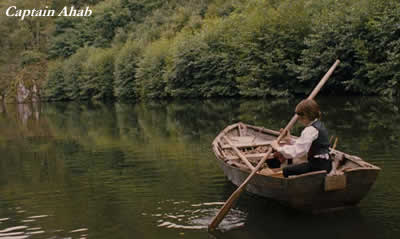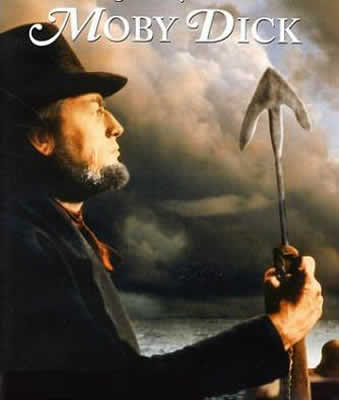FILM COMMENTS SELECTS is an inspiring film series presenting noteworthy international productions with little or no exposure in the US to NY audiences.
The series’ most recent screening at the Walter Reade Theater was CAPTAIN AHAB by French filmmaker Philippe Ramos. Gavin Smith, editor of Film Comment, discovered the film at this years Rotterdam Film Festival and introduced his choice for the evening’s entertainment.
CAPTAIN AHAB, a French-Swedish co-production, premiered at last years Locarno Film Festival and was awarded Best Director as well as the prestigious Fipresci Award – but so far has not been picked up for distribution in the US.
The film tells Captain Ahab’s life story and is inspired by Herman Melville’s classic novel MOBY DICK. Beautifully shot by Laurent Desmet and powerfully performed by a strong cast – the film is a visual poem. Ramos, who directed and wrote the script, also edited the film  and contributed to the set design.
and contributed to the set design.
Told in 5 chapters, the film follows Captain Ahab from birth to death and offers us some insight into his character, his life and times, and hints at what lead to his paranoid pursuit of the white whale.
Each of the five chapters focuses on the people that shaped and influenced Ahab’s life: his father, his aunt, a priest, his lover and Starbuck, his first mate aboard the Pequod. The first four chapters are mainly inspired by Melville and take us through Ahab’s life until he begins his obsessive hunt for Moby Dick. The fifth chapter is a visually stunning, poetic summary of John Huston’s 1956 classic MOBY DICK. Some of Ramos’ shots are inspired by MOBY DICK – however, they never compete with the classic, instead simply evoking the memory of Huston’s powerful work. Instead of reenacting the final hunt by using state–of-theart special effects, Ramos opted to keep Ahab and the whale far apart – the whale deep under water and Ahab above, aboard his ship – never sharing any screen time together.
During the first part of the film the young Ahab is played by Virgil Leclaire. Already an accomplished actor with a long list of French films to his credit, he is well cast by Ramos. The juxtaposition between  Leclaire’s innocent face and delicate body and his strong will and violent outbursts captivates the viewer.
Leclaire’s innocent face and delicate body and his strong will and violent outbursts captivates the viewer.
At the end of the 3rd chapter, Ramos skillfully matches the younger and older Ahab – and seamlessly transitions to the adult, played by Denis Lavant. We jump 30 years ahead and enter the story when Ahab returns home after years of whale hunting at sea, defeated by the white whale that left him crippled and scarred for life.
Throughout the film, Ramos inserts short reflective moments filled with most beautiful dreamlike images: like a gigantic Ahab reaching down into the ocean to pick up a small white light with just one hand, or the repeated use of black oval frames to introduce different characters – as if peeking through a keyhole.
Unlike Huston’s tragic adventure drama, with lots of high charged action sequences, Ramos film is quiet and slow. But just like in MOBY DICK, Ahab’s character is never given a moment of release, a glimpse of lightness, or enjoyment. All throughout the film, Ahab is buried deep inside himself.
Denis Lavant as the old Ahab has a mesmerizing screen presence, like always, but most memorable in Claire Denis’ stunning BEAU TRAVAIL – a free adaptation of Melville’s book BILLY BUDD, SAILOR. Lavant is one of the most physical actors around. His presence and performance in BEAU TRAVAIL radiates burning rage and anger combined with sensuous vulnerability. The film’s closing scene is pure physical performance – telling more than words. (http://www.youtube.com/watch?v=8e5g_wXJf1I)
In CAPTAIN AHAB, Lavant displays the same internal and external intensity–
offering glimpses into his character’s manic obsession with Moby Dick.
Hopefully, the film will be picked up for distribution in the US. Besides holding its own as an elegant piece of art, it should also have a lasting life in any school and university library – as an intriguing compendium to Melville’s as well as Huston’s classics.

